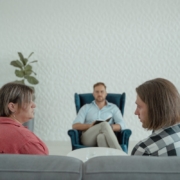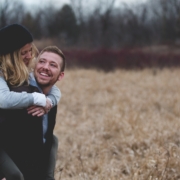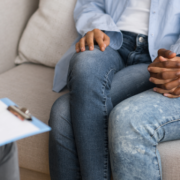50 Marriage Counseling Questions for Before and During Marriage
Marriage counseling—to some, it indicates failure. To others, it’s a sign of hope. And to many, it’s new and unknown territory, one that might have you Googling “marriage counseling tips” or “ground rules for couples therapy” on your phone in the middle of the night.
At Well Marriage Center, we’re all about debunking couples therapy myths and showing people the very possible and positive outcomes that can result from counseling. This is why we love answering questions like, “How can marriage counseling help a couple improve their relationship?” and “What can we expect during couples therapy?” Clients who ask these kinds of questions and who are willing to work through issues are usually the ones who find the most success from relationship counseling.
With that in mind, we’ve put together 50 of our favorite counseling questions for the different stages of a relationship. We hope this will help you feel a bit more comfortable and prepared for the journey. Plus, we’ll give you a few tips to make the most of each therapy session.
Premarital Counseling
Premarital (aka “pre-marriage”) counseling is an excellent way to embark on the adventure of marriage with your partner. Even if your relationship has gone relatively smoothly so far, time and the pressures of married life can introduce new and unforeseen issues.
Those who are new to the concept of premarital counseling might wonder—does it actually work? Will it create more problems instead of solving potential issues? Many scholars, psychologists, social workers, and beyond have asked these same questions, and there are plenty of studies demonstrating the positive effects of premarital counseling.
For example, one clinical research study entitled “Marital Satisfaction: The Impact of Premarital and Couples Counseling” found that “participants who had taken part in premarital counseling do show a trend toward high marital satisfaction.”
Another study, “Using What Premarital Couples Already Know to Inform Marriage Education” found that, “…marriage education may assist in the couples’ identification of factors that enhance and hinder their relationship. Furthermore, couples may be able to apply this knowledge to make lasting changes in their relationships.”
So we ask you—why not try it? Why not start your marriage off with the tools to enhance your relationship? Why not identify possible roadblocks and ways to overcome them? Any married couple will tell you marriage isn’t easy, but it can be an easier, happier, and more fulfilling experience through premarital counseling.
What Kind of Questions Are Asked in Pre-Marriage Counseling?
To get started with our 50 relationship counseling questions, let’s check out some of the more common pre-marriage counseling questions for couples we like to ask at Well Marriage Center:
- When you are about to see your partner, what thoughts and feelings go through your mind?
- If you had to name your partner’s top three dreams or aspirations, what would they be?
- How important is wealth to you, and how do you feel about debt?
- What are your plans for financing large purchases, such as a house, cars, or your children’s college education?
- How do you plan to budget and organize your money? For example, will you keep separate or joint accounts?
- Do you have any retirement plans currently in place? And how are you planning for retirement together as a couple?
- What rituals do you currently have, like date nights, daily routines, weekend getaways, or vacations? And how have you shared these rituals with one another?
- How do you currently celebrate special occasions now, like anniversaries or holidays? And how would you like to blend or take part in those traditions together? For example, if your extended families live far apart, how will you choose where to spend time for major holidays?
- How do you plan to sustain intimacy throughout your relationships?
- How would you describe your sexual needs and desires, and are there specific ways you’d like your partner to meet those needs?
- Are you both on the same page when it comes to having children? If you want children, how many would you like to have? If infertility is an issue, how do you plan to address that?
- What is your sense of humor like? Does your partner experience humor in the same way?
- How do you plan to divide household chores?
- Do you both have the same values or religious beliefs? If not, how do you plan to navigate those differences?
- What does “infidelity” or “cheating” mean to you, and what are your fears or expectations about this in your relationship?
Pre-Marriage Counseling Tips
Coming to premarital counseling having done your research is a great way to start the process. You’ll have time to consider questions beforehand and know what to expect. During the actual counseling session, here are some other tips to keep in mind:
- Seek to know each other deeply. When we’re dating someone, we have a tendency to be on our best behavior. But nobody is perfect, and everyone has flaws and weaknesses. Use premarital counseling as an opportunity to understand each other on a more meaningful level—the good and challenging parts!
- Make sure you address the big stuff. Money, sex, children, religion, substance abuse, politics—these areas can create serious problems if you and your partner have different viewpoints. For example, if your partner is a practicing Buddhist and you’re an atheist, or you’re a recovering alcoholic and your partner drinks regularly—these are not necessarily deal breakers, but they are definitely issues that should be addressed and fleshed out before marriage.
- Don’t ignore any nagging feelings. You may learn things about your partner you didn’t know before, and anything that bothers you now will no doubt continue to bother you as time goes on. If something new comes up and it worries you, premarital counseling is the perfect place to address it.
Marriage Counseling and Couples Therapy
The topics addressed in marriage counseling (aka “couples therapy”) are usually a bit different than premarital counseling. Newer relationships can use premarital counseling to fully discover and understand one another, while married couples or those in a committed, long-term relationship might be past the discovery stage and looking to find their way back to one another.
However, many of the themes in both types of counseling are the same. Both seek to address potential or present issues, overcome those challenges, and prevent them in the future. We see married and unmarried couples at Well Marriage Center looking for proactive ways to make their relationship better.
What Are Some Couples Counseling First Session Questions?
The questions and discussions topics in your first counseling session will allow your counselor to get to know you and your partner. Even as you answer these icebreaker questions, though, your counselor will be observing how you interact with one another to better inform their advice and approach in future therapy sessions.
At Well Marriage Center, all of our first sessions are extended to 90 minutes, since our counselors will need a little extra time to get to know you and your partner. In that initial session, your Well Marriage Center counselor will begin with a structured relationship strengths and wellness assessment. We like to think of it as starting on a positive note to remind you both what brought you together in the first place. The following sessions will dig progressively deeper, but that first session is a time for discovery between you and your counselor—and you and your partner.
Curious about the kinds of questions to expect during your first session? Here are a few your counselor may start with:
- What is the story on how the two of you met
- What initially attracted you to each other
- What were some of your initial “admirations” of each other
- What are 3 good times you’ve had together…and what made them good
- In general, how would you describe your life and marriage together?
- What does the timeline of your relationship look like? Can you tell me about major life events (new jobs, traumas, kids, etc.) from when you first met up through present day
- What strengths do you bring to the table in your relationship? And what strengths do you think your partner has?
- Do you have any prior experience with marriage counseling or other types of therapy?
- What made you decide to seek marriage counseling?
- Have you tried anything to resolve present issues before seeking counseling? What did you try and how did that go?
- What do you expect to get out of couples therapy?
- Do you currently want to stay with your partner? Why or why not?
- Are you willing to put in the work and make changes to improve the quality of your marriage?
What Do Couples Talk About in Marriage Counseling?
The good—but sometimes tough—talks can begin once you and your partner have brought your counselor up to speed. However, answering the question of “What do you talk about during marriage counseling?” is a little challenging due to the varying needs of each couple.
Every counselor will have their own couples therapy techniques to better understand their clients and get to the root of each problem. These techniques might include answering basic questions that prompt discussion, taking turns to be active listeners, engaging in activities to reveal new things about your relationship, and more.
Ultimately, depending on which counselor you work with and the particular nature of your relationship, every discussion in couples therapy will be unique. And because each counselor will work a little differently, you might find that one counselor is a better fit over another. That’s okay! If one therapist isn’t working out, it doesn’t mean your marriage is doomed or all hope is lost. It simply means another counselor may have a different approach that works better for you and your partner.
What Questions Are Asked in Couples Therapy?
Even though every couples therapy session will look a little different from couple to couple, there are some general questions you will likely work through as your counseling sessions progress, like:
- What made you fall in love with your partner originally? And why do you think your partner fell in love with you?
- What are the biggest similarities between you and your partner? And what are the biggest differences?
- If you could resolve any of your relationship problems in an instant, which problem would you choose?
- Think about your communication with your partner when you’re experiencing different emotions—happiness, sadness, anger, fear, disappointment, etc. How does this affect your and your partner’s ability to communicate?
- What are some ways that you show your partner you care, love, and appreciate them? How do you feel they demonstrate this back to you?
- What is your favorite and least favorite childhood memory? Do you know your partner’s favorite and least favorite childhood memory?
- Do you ever find yourself lying awake at night thinking about your relationship? If so, what is the number one thing that crosses your mind?
- How would you describe your sex life? Is there anything your partner could do to make your sexual relationship better? What have you done to improve sex in your marriage?
- If your partner does something that bothers you, how do you address that with them? And when your partner brings up issues they may have with you, how do you handle or act on that?
- Does your partner treat you with the level of respect you desire? Is it the same, better, or worse than the beginning of your relationship? Why do you think that is?
- Are there any dreams you or your partner have yet to accomplish? If so, what’s stopping you from accomplishing them?
- Have there been any times in your relationship where you felt you could not be your genuine self? Why did you feel that way?
- Do you and your partner enjoy any activities or shared hobbies together? Are there any that you do alone? And do you like having your own hobbies, or do you like to share them with your partner?
- Which topic or area do you have the most trouble opening up about with your partner? Why do you think that is?
What Are Questions to Ask During Marriage Counseling to Your Counselor?
Therapy is always a two way street—between you and your partner, but also between you and your counselor. Don’t be afraid to ask your therapist questions before starting counseling and during your sessions. Here are some questions that you might want to consider asking your therapist at different points during your counseling journey:
- What is your education, training, and background as a marriage counselor?
- How many years of experience do you have, including the required supervised clinical experience you had to complete to obtain your license?
- Are you a licensed clinical social worker, licensed marriage and family therapist, licensed professional counselor, or something else? And how does this background influence your work?
- How many couples do you see a week? Have you made couples counseling your sole speciality?
- Do you have any client testimonials or stories you can share with us?
- What’s the average number of therapy sessions your successful clients go through? And how many would you recommend for us after understanding our present issues and goals?
- Do you feel that we are making progress? Why or why not?
- Are there additional resources you offer that we can take advantage of along with attending counseling sessions?
How Do You Have a Successful Marriage Counseling Session? Try Well Marriage Center
Trust us, we get it—relationships today face numerous hurdles, expectations, and pressures. With so much negativity weighing down on us everyday, our counselors like to take a positive, pro-relationship approach to couples therapy sessions. This means we focus on the good that you bring to your relationship, how to harness your strengths, and ultimately advocate for a successful marriage.
With this approach, we have found our clients spend less time in therapy and can more effectively navigate relationship challenges. Our experienced and licensed counselors have a wide variety of techniques and marriage counseling questions to strengthen your relationship, tailoring every experience to your unique story.
If you’re ready to take that first step, start by filling out our short intake form and setting up a consultation with our Intake Coordinator, Melinda. She is happy to answer any questions you may have, walk you through the process, and ensure you are connected with the best counselor for your needs.
Is couples therapy easy? No—it takes work from both sides. But is it worth it for a happier, stronger, and healthier relationship? Absolutely.










